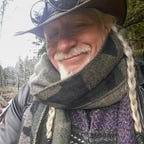Myth & Pathways to Bliss
When most people hear the word “myth” or “mythology” they think falsehood, something not true. Although this is a common use of the word, it is clearly pejorative and does not represent the true meaning of the word mythology.
“A myth is a story, often enacted by a ritual, and shared among a community which represents timeless truths about man’s relationship with nature, the cosmos or his own authentic self.”
Literally the word mythology comes from the Greek word “mythos” meaning “speech” or “spoken story of a people”. A set of stories relevant to or holding significant meaning for, a particular culture, religion or society and often dealing with human origins, sacrifice, the afterlife and the gods. Since early man was intimately connected to his environment and the creatures which sustained the community, it is also not surprising that many of mythological stories of early or indigenous cultures represented sacrifice, reverence, worship and celebration of these relationships of dependence with the natural world.
Joseph Campbell is considered one of the world’s greatest scholars and writers on comparative mythology/religion. Throughout his life, 35 years of teaching and across dozens of books, his most revelatory discovery after studying the mythologies from cultures and civilizations around the world, is that most myths share common, if not identical, themes and connotations. Since many of these cultures were separated by time or geography — often thousands of years or thousands of miles — Campbell concluded that the similarity in these myths across so many cultures, time and geography must arise out of the subconscious realm of human experience and psychology shared by all humans. As Joseph Campbell described myths, they are the “spontaneous products of the psyche”. The psychologist Carl Jung also proposed a similar construct of interconnected psychology called the collective unconscious.
“These [mythological] symbols stem from the psyche; they speak from and to the spirit. And they are in fact the vehicles of communication between the deeper depths of our spiritual life and this relatively thin layer of consciousness by which we given our daylight existences.” (Joseph Campbell)
One of the most common mythological themes discovered by Campbell is that of the Hero’s Journey. This is a common psycho/spiritual story of human transformation which appears in nearly every culture, every religion and every spiritual practice. The myth of the Hero’s Journey is so pervasive to the Human Experience that once you understand its pattern, you will recognize it in nearly every novel, every movie and even most computer game story-lines in one form or another. As a matter of fact and trivia, Joseph Campbell’s long-time friend George Lucas developed the story line and mythological themes for the entire Star Wars Trilogy after reading Campbell’s seminal work The Hero With a Thousand Faces.
Although the structure of the Hero’s Journey according to Campbell contains 17 stages, the basic structure is very simple:
- The Call to Adventure
- The Journey and Trials
- The Awakening to New Wisdom
- The Return to the Community
What is important to note is that Hero’s Journey is not some esoteric or “special” experience reserved only for the Rob Roy’s, Buddha’s, Gandhi’s or Chief Seattle’s of the world. It is a model of personal growth and development not only available to everyone, but pursued by more and more people today who are dissatisfied with their lives, careers or non-secular/dogmatic religions.
“What I think is that a good life is one hero journey after another. Over and over again, you are called to the realm of adventure, you are called to new horizons. Each time, there is the same problem: do I dare? And then, if you do dare, the dangers are there, and the help also, and the fulfillment or the fiasco. There’s always the possibility of a fiasco. But there’s also the possibility of bliss.” (Joseph Campbell)
Each one of us has been given a life through which we can become our own Hero’s. We can be called towards or make a conscious choice to follow, a higher purpose, a Bigger Calling in life. Once we hear that Calling, it comes down to whether or not we are going to CHOOSE to answer the Call to Adventure. Once you do, then you cross the Threshold into another realm of existence, a different plane and pathway of your own life. There will then be Trials & Obstacles, along with Helping Hands to guide you along your Journey. At some point there may come an Awakening, a newfound Wisdom or Realization. At this transitional and transformational point along your own Hero’s Journey, you may then experience a call for the Return. With your newfound Wisdom, newly Expanded Self, you bring these gifts back to the community so that others may learn from your experience and be encouraged to answer their own Call to Adventure.
- So what do you want to do with YOUR LIFE?
- Have you heard The CALLING?
- How are you going to RESPOND?
- Will you follow your own PATHWAY TO BLISS?
“Follow your bliss. If you do follow your bliss, you put yourself on a kind of track that has been there all the while waiting for you, and the life you ought to be living is the one you are living. When you can see that, you begin to meet people who are in the field of your bliss, and they open the doors to you. I say, follow your bliss and don’t be afraid, and doors will open where you didn’t know they were going to be. If you follow your bliss, doors will open for you that wouldn’t have opened for anyone else.” (Joseph Campbell)
Originally published at Scribbles of a Jolly Mystic Dude.
